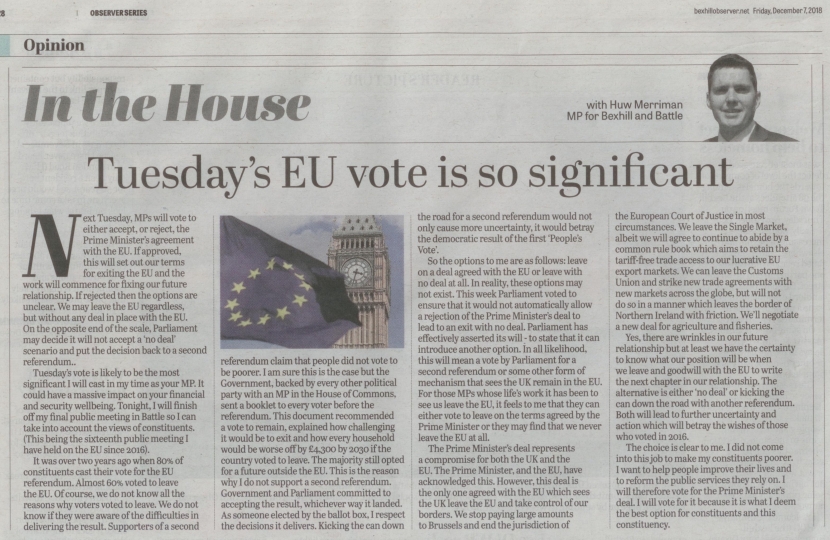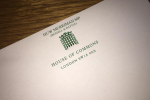
Next Tuesday, MPs will vote to either accept, or reject, the Prime Minister’s agreement with the EU. If approved, this will set out our terms for exiting the EU and the work will commence for fixing our future relationship. If rejected then the options are unclear. We may leave the EU regardless, but without any deal in place with the EU. On the opposite end of the scale, Parliament may decide it will not accept a ‘no deal’ scenario and put the decision back to a second referendum.
Tuesday’s vote is likely to be the most significant I will cast in my time as your MP. It could have a massive impact on your financial and security wellbeing. Tonight, I will finish off my final public meeting in Battle so I can take into account the views of constituents. (This being the sixteenth public meeting I have held on the EU since 2016).
It was over two years ago when 80% of constituents cast their vote for the EU referendum. Almost 60% voted to leave the EU. Of course, we do not know all the reasons why voters voted to leave. We do not know if they were aware of the difficulties in delivering the result. Supporters of a second referendum claim that people did not vote to be poorer. I am sure this is the case but the Government, backed by every other political party with an MP in the House of Commons, sent a booklet to every voter before the referendum. This document recommended a vote to remain, explained how challenging it would be to exit and how every household would be worse off by £4,300 by 2030 if the country voted to leave. The majority still opted for a future outside the EU. This is the reason why I do not support a second referendum. Government and Parliament committed to accepting the result, whichever way it landed. As someone elected by the ballot box, I respect the decisions it delivers. Kicking the can down the road for a second referendum would not only cause more uncertainty, it would betray the democratic result of the first ‘People’s Vote’.
So the options to me are as follows: leave on a deal agreed with the EU or leave with no deal at all. In reality, these options may not exist. This week Parliament voted to ensure that it would not automatically allow a rejection of the Prime Minister’s deal to lead to an exit with no deal. Parliament has effectively asserted its will - to state that it can introduce another option. In all likelihood, this will mean a vote by Parliament for a second referendum or some other form of mechanism that sees the UK remain in the EU. For those MPs whose life’s work it has been to see us leave the EU, it feels to me that they can either vote to leave on the terms agreed by the Prime Minister or they may find that we never leave the EU at all.
The Prime Minister’s deal represents a compromise for both the UK and the EU. The Prime Minister, and the EU, have acknowledged this. However, this deal is the only one agreed with the EU which sees the UK leave the EU and take control of our borders. We stop paying large amounts to Brussels and end the jurisdiction of the European Court of Justice in most circumstances. We leave the Single Market, albeit we will agree to continue to abide by a common rule book which aims to retain the tariff-free trade access to our lucrative EU export markets. We can leave the Customs Union and strike new trade agreements with new markets across the globe, but will not do so in a manner which leaves the border of Northern Ireland with friction. We’ll negotiate a new deal for agriculture and fisheries.
Yes, there are wrinkles in our future relationship but at least we have the certainty to know what our position will be when we leave and goodwill with the EU to write the next chapter in our relationship. The alternative is either ‘no deal’ or kicking the can down the road with another referendum. Both will lead to further uncertainty and action which will betray the wishes of those who voted in 2016.
The choice is clear to me. I did not come into this job to make my constituents poorer. I want to help people improve their lives and to reform the public services they rely on. I will therefore vote for the Prime Minister’s deal. I will vote for it because it is what I deem the best option for constituents and this constituency.



